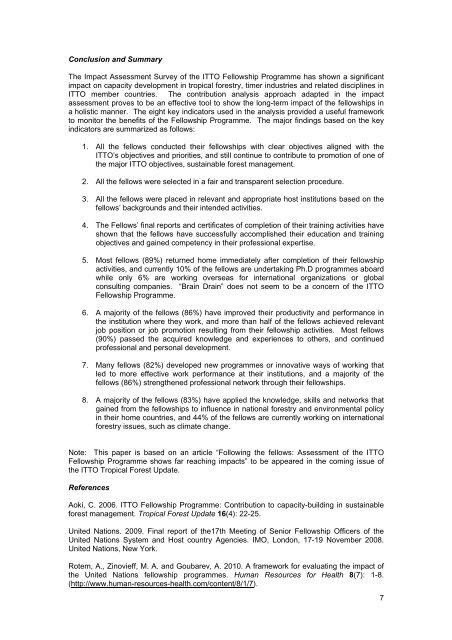Impact Assessment Survey of the ITTO Fellowship ... - Development
Impact Assessment Survey of the ITTO Fellowship ... - Development
Impact Assessment Survey of the ITTO Fellowship ... - Development
You also want an ePaper? Increase the reach of your titles
YUMPU automatically turns print PDFs into web optimized ePapers that Google loves.
Conclusion and Summary<br />
The <strong>Impact</strong> <strong>Assessment</strong> <strong>Survey</strong> <strong>of</strong> <strong>the</strong> <strong>ITTO</strong> <strong>Fellowship</strong> Programme has shown a significant<br />
impact on capacity development in tropical forestry, timer industries and related disciplines in<br />
<strong>ITTO</strong> member countries. The contribution analysis approach adapted in <strong>the</strong> impact<br />
assessment proves to be an effective tool to show <strong>the</strong> long-term impact <strong>of</strong> <strong>the</strong> fellowships in<br />
a holistic manner. The eight key indicators used in <strong>the</strong> analysis provided a useful framework<br />
to monitor <strong>the</strong> benefits <strong>of</strong> <strong>the</strong> <strong>Fellowship</strong> Programme. The major findings based on <strong>the</strong> key<br />
indicators are summarized as follows:<br />
1. All <strong>the</strong> fellows conducted <strong>the</strong>ir fellowships with clear objectives aligned with <strong>the</strong><br />
<strong>ITTO</strong>’s objectives and priorities, and still continue to contribute to promotion <strong>of</strong> one <strong>of</strong><br />
<strong>the</strong> major <strong>ITTO</strong> objectives, sustainable forest management.<br />
2. All <strong>the</strong> fellows were selected in a fair and transparent selection procedure.<br />
3. All <strong>the</strong> fellows were placed in relevant and appropriate host institutions based on <strong>the</strong><br />
fellows’ backgrounds and <strong>the</strong>ir intended activities.<br />
4. The Fellows’ final reports and certificates <strong>of</strong> completion <strong>of</strong> <strong>the</strong>ir training activities have<br />
shown that <strong>the</strong> fellows have successfully accomplished <strong>the</strong>ir education and training<br />
objectives and gained competency in <strong>the</strong>ir pr<strong>of</strong>essional expertise.<br />
5. Most fellows (89%) returned home immediately after completion <strong>of</strong> <strong>the</strong>ir fellowship<br />
activities, and currently 10% <strong>of</strong> <strong>the</strong> fellows are undertaking Ph.D programmes aboard<br />
while only 6% are working overseas for international organizations or global<br />
consulting companies. “Brain Drain” does not seem to be a concern <strong>of</strong> <strong>the</strong> <strong>ITTO</strong><br />
<strong>Fellowship</strong> Programme.<br />
6. A majority <strong>of</strong> <strong>the</strong> fellows (86%) have improved <strong>the</strong>ir productivity and performance in<br />
<strong>the</strong> institution where <strong>the</strong>y work, and more than half <strong>of</strong> <strong>the</strong> fellows achieved relevant<br />
job position or job promotion resulting from <strong>the</strong>ir fellowship activities. Most fellows<br />
(90%) passed <strong>the</strong> acquired knowledge and experiences to o<strong>the</strong>rs, and continued<br />
pr<strong>of</strong>essional and personal development.<br />
7. Many fellows (82%) developed new programmes or innovative ways <strong>of</strong> working that<br />
led to more effective work performance at <strong>the</strong>ir institutions, and a majority <strong>of</strong> <strong>the</strong><br />
fellows (86%) streng<strong>the</strong>ned pr<strong>of</strong>essional network through <strong>the</strong>ir fellowships.<br />
8. A majority <strong>of</strong> <strong>the</strong> fellows (83%) have applied <strong>the</strong> knowledge, skills and networks that<br />
gained from <strong>the</strong> fellowships to influence in national forestry and environmental policy<br />
in <strong>the</strong>ir home countries, and 44% <strong>of</strong> <strong>the</strong> fellows are currently working on international<br />
forestry issues, such as climate change.<br />
Note: This paper is based on an article “Following <strong>the</strong> fellows: <strong>Assessment</strong> <strong>of</strong> <strong>the</strong> <strong>ITTO</strong><br />
<strong>Fellowship</strong> Programme shows far reaching impacts” to be appeared in <strong>the</strong> coming issue <strong>of</strong><br />
<strong>the</strong> <strong>ITTO</strong> Tropical Forest Update.<br />
References<br />
Aoki, C. 2006. <strong>ITTO</strong> <strong>Fellowship</strong> Programme: Contribution to capacity-building in sustainable<br />
forest management. Tropical Forest Update 16(4): 22-25.<br />
United Nations. 2009. Final report <strong>of</strong> <strong>the</strong>17th Meeting <strong>of</strong> Senior <strong>Fellowship</strong> Officers <strong>of</strong> <strong>the</strong><br />
United Nations System and Host country Agencies. IMO, London, 17-19 November 2008.<br />
United Nations, New York.<br />
Rotem, A., Zinovieff, M. A. and Goubarev, A. 2010. A framework for evaluating <strong>the</strong> impact <strong>of</strong><br />
<strong>the</strong> United Nations fellowship programmes. Human Resources for Health 8(7): 1-8.<br />
(http://www.human-resources-health.com/content/8/1/7).<br />
7

















